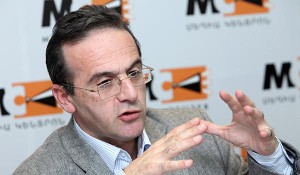Armenia-EU Agreement: will it work or not?
18:03, December 2, 2017 | News, Other news Our guest is Artur Sakunts, the chairperson of Helsinki Citizens’ Assembly Vanadzor.
Our guest is Artur Sakunts, the chairperson of Helsinki Citizens’ Assembly Vanadzor.
– Mr. Sakunts, will the human rights defense and the other democratic institutions in general be fortified in our country after signing the agreement between the Republic of Armenia and the European Union?
– Prior to signing this agreement with the European Union, we had already signed and therefore supported other documents pertaining to human rights as a member state of the Council of Europe, the UNO as well as the OSCE. In fact, we have already verified this entire package in regard to human rights and undertaken the commitment to implement it. Thus, the current agreement signed with the European Union does not presuppose the need to sign other documents. It’s all about bringing it all to life and strengthening the other democratic standards prescribed by those existing documents. What I mean is that even without this agreement, the authorities of Armenia should have the will necessary to implement the undertaken commitments. Only one element has been added by the agreement; there is a financial component that is missing when it comes to the membership to the UNO and other institutions. And the question is quite straightforward – will the authorities of Armenia at least take a step or not? And I don’t think it can be effective if the political will is conditioned by financial expectations.
– Do you think our authorities are capable of blowing smoke?
– I’ve already mentioned this and I’m insisting on it once again, if all this time, having signed such international documents, they’ve been pretending to have a substantive approach to their work, why would they not do the same now? Does signing this document make them democratic overnight or does it make them concerned about human rights violations especially given the fact that they disgracefully failed to adopt the law on domestic violence a few days before signing that document? Has the crime of March 1 been disclosed? Have the perpetrators been held accountable for that? After all, we have a wide range of problems, aimed at the solution of which no steps have been taken throughout all these years. So how can trust be built in bringing about a change by signing this agreement?
– So is it only the financial aspect that can motivate our authorities to take real steps?
– First, let’s note that they signed this document merely owing to the financial expectations. And these changes can also be accounted for by these expectations. However, I’m not positive the authorities will make those changes unless we put pressure on them. And with all this, I’m confident that our authorities are not the bearer of comprehensive human rights defense because if they were, they would not propose the nation-army concept, especially without putting it down to paper.
– And is our society ready to put pressure on the authorities to ensure the implementation of those changes? Do we have such a conscious society?
– And have the authorities attempted to make the society an integral part in implementing the changes prescribed by the agreement? Of course, they haven’t, because the authorities, in their essence, are neither democratic nor a bearer of social values or values of a lawful state and sovereignty.
Our authorities have not had flaws in the way they carry out their duties; in fact, they have been twiddling their thumbs, not even trying to raise the awareness of society and engage it in human rights defense and the discussions on the problems of democratic institutions. And the authorities were not even willing to engage the society in implementing reforms.
As a result, there are only a handful of civil society institutions remaining in the country, which are regularly condemned as foreign agents by the government-supported groups. This is our reality.
So there is a serious problem in our country related to the society as well. Yet, I’m not blaming the society, and I find the government to be the one responsible for it. For instance, have you seen the Public Television hold discussions or debates around these questions? Usually, this doesn’t happen there, and that is a specific policy that is being carried out in our country.
